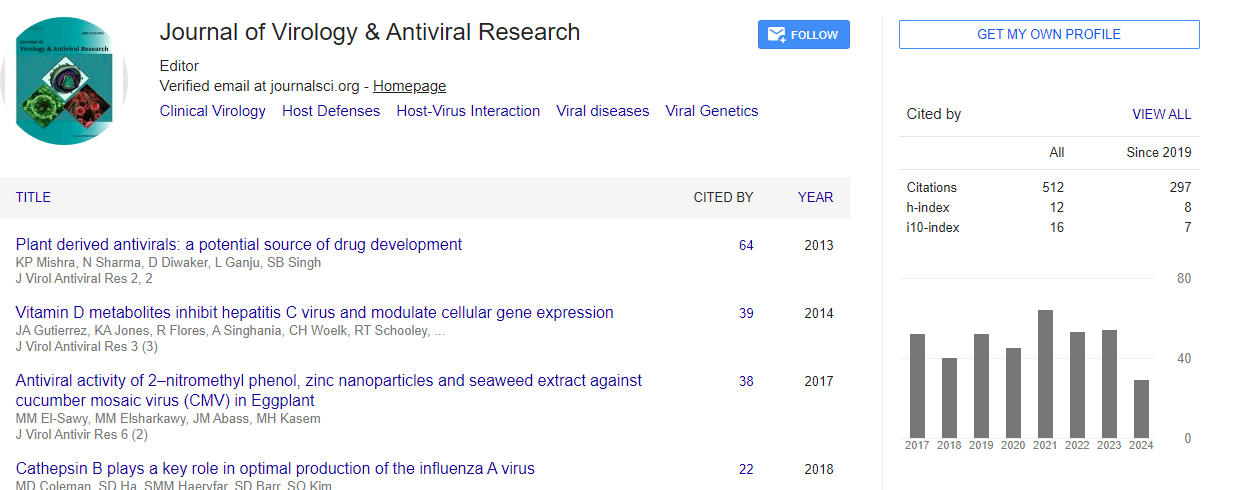Perspective, J Virol Antivir Res Vol: 12 Issue: 1
New Frontiers in Anti-Viral Research
Nerea Montagnani*
1Department of Internal Medicine I, University of Bonn, Bonn, Germany
*Corresponding Author: Nerea Montagnani
Department of Internal Medicine I,
University of Bonn, Bonn, Germany;
E-mail: neremont@ukb.uni-bonn.de
Received date: 14 February, 2023; Manuscript No. JVA-23-93053;
Editor assigned date: 17 February, 2023; PreQC No. JVA-23-93053 (PQ);
Reviewed date: 03 March, 2023; QC No. JVA-23-93053;
Revised date: 10 March, 2023; Manuscript No. JVA-23-93053 (R);
Published date: 17 March, 2023; DOI: 10.4172/2324-8955.1000667
Citation: Montagnani N (2023) New Frontiers in Anti-Viral Research. J Virol Antivir Res 12:1.
Description
Viruses pose a significant threat to human health, causing a wide range of diseases ranging from the common cold to severe infections such as Coronavirus disease (COVID-19). While vaccines have been successful in preventing many viral infections, there remains a need for effective anti-viral therapies to treat those who become infected.
Advancements
Recent advancements in anti-viral research have led to the discovery of new treatments and approaches for combating viral infections.
CRISPR/Cas9 technology: Clustered Regularly Interspaced Short Palindromic Repeats (CRISPR)/CRISPR-Associated (Cas9) is a revolutionary gene-editing tool that has been used to develop new therapies for genetic diseases. Recently, researchers have begun exploring the use of CRISPR/Cas9 for targeting and destroying viral Deoxyribonucleic Acid (DNA) in infected cells. This technology has shown promise in treating viral infections such as Human Immunodeficiency Virus (HIV), Human Papillomavirus (HPV), and hepatitis B.
Monoclonal antibodies: Monoclonal antibodies are synthetic proteins that mimic the immune system's response to viral infections. These antibodies can be engineered to target specific viruses and prevent them from infecting cells. Monoclonal antibodies have been successful in treating viral infections such as Ebola, and have shown promise in treating COVID-19.
Nanoparticles: Nanoparticles are tiny particles that can be engineered to target and destroy viruses. Researchers have developed nanoparticles that mimic the structure of viruses and can bind to and neutralize them. These nanoparticles have shown promise in treating viral infections such as influenza and herpes.
Combination therapy: Combination therapy involves using multiple drugs to treat viral infections. This approach is often used to prevent the development of drug-resistant strains of viruses. Combination therapy has been successful in treating HIV and is being explored as a potential treatment for COVID-19.
RNA interference: Ribonucleic Acid (RNA) interference is a natural process in which small RNA molecules silence genes. Researchers have developed synthetic RNA molecules that can be used to silence viral genes and prevent viral replication. This approach has shown promise in treating viral infections such as hepatitis B and C.
Broad-spectrum antivirals: Broad-spectrum antivirals are drugs that are effective against multiple viruses. These drugs are designed to target common features of viruses, such as their ability to replicate. Broad-spectrum antivirals have been successful in treating viruses such as influenza and are being explored as a potential treatment for COVID-19.
Viral vaccines: Vaccines are a critical tool in preventing viral infections. Recent advancements in vaccine technology have led to the development of new types of vaccines, such as messenger RNA (mRNA) vaccines. These vaccines have been successful in preventing COVID-19 and are being explored as a potential treatment for other viral infections.
Artificial intelligence: Artificial intelligence is being used to develop new drugs and therapies for viral infections. Machine learning algorithms can be trained to identify potential drug targets and predict the effectiveness of new drugs. This approach has the potential to accelerate drug discovery and development for viral infections.
Conclusion
New frontiers in anti-viral research are opening up exciting new possibilities for the treatment and prevention of viral infections. From gene editing to nanoparticle therapy, researchers are developing innovative approaches to combat viral infections. These advancements have the potential to revolutionize the field of medicine and improve the health outcomes for millions of people worldwide.
 Spanish
Spanish  Chinese
Chinese  Russian
Russian  German
German  French
French  Japanese
Japanese  Portuguese
Portuguese  Hindi
Hindi 

